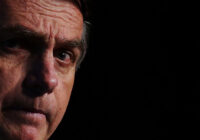The record number of corporate jets landing in Davos are testimony to a toxic ideology that must be replaced by a more humane zeitgeist.
This author has been in touch with some of the Davos jet set. He can attest that the people who gather every year in Switzerland at the World Economic Forum do not have red horns and a spiky tail. They can be perfectly reasonable, civil and courteous in normal conversation.
Yet it is crystal clear that something strange and wondrous happens to them when they reach Davos. With some exceptions, the Davos jet set act with a sense of entitlement that they were born to enjoy wealth, power and priesthood, all together.
VERSAILLES IN THE SNOW
In 1971, a Swiss-German business professor in John Calvin’s French-speaking city of Geneva came up with a splendid idea. The talented Professor Klaus Schwab invited 444 executives from the western side of the Iron Curtain to an Alpine village to introduce them to American management practices.
During the height of the Cold War, this event took off like a rocket. Soon, not only business but also political leaders started making the annual pilgrimage to Davos. After the Berlin Wall collapsed and the Soviet Union crumbled, Davos become the symbol of the dominant economic order. Wannabes from emerging economies flocked to Davos to prove to themselves and their people back home that they had arrived on the global stage. Rumor has it that Swiss bank accounts were a key reason for this winter pilgrimage. Inevitably, the discreet annual get-together turned into a gauche nouveau riche circus.
This year, the circus turned incongruous. David Attenborough turned up to plead with 1,500 global leaders to take urgent action on climate change. Even as the 92-year-old was exhorting his audience to save the Garden of Eden, they were flying in using an estimated 1,500 private jets, setting a new record in the process. The Davos jet set clearly invited Attenborough as window dressing even as they continue to buy bigger and more expensive jets. It is pertinent to note that, in a world of rising inequality, the number of private jet flights grew by 11% in 2018.
Davos has now become an exclusive club for rapacious self-serving elites who live in a world of private splendor and public squalor. It is a symbol of an economic order that is fundamentally unjust but legitimizes itself through the gospel of growth and Pablum about philanthropy, climate change and gender equality. Its hypocrisy is increasingly obvious even to its pilgrims.
Absolute belief in big business is central to the Davos ethos. In the brave new world after 1991, multinational corporations have usurped the power once wielded by nation-states. Stefanio Marcuzzi and Alessio Terzi from dysfunctional Italy rightly argue that “faltering GDP growth, record-level public debt, increasingly polarized politics, and legislative paralysis” have chipped away at the authority and legitimacy of nation-states. Apple’s revenues exceed Portugal’s, Walmart’s income outstrips Belgium’s. Davos celebrates this development.
It is important to note that the Davos ethos is not exactly new. A few centuries ago, multinationals emerged more powerful than states and empires. The British East India Company grew opium in India and sold it in China. Its supporters justified famine in India and addiction in China on grounds of free trade and economic progress.
This year, billionaire Michael Dell smugly made a similar fallacious assertion at Davos. He claimed there was no incidence of strong economic growth in societies with high taxes for the rich. Even as moderator Heather Long of The Washington Post laughed nervously and obsequiously, Erik Brynjolfsson of the Massachusetts Institute of Technology (MIT) pointed out that Dell was simply and plainly wrong. From the 1930s to the 1960s, none other than the US taxed its rich at rates of over 70% while growing robustly. In fact, Nobel laureate Michael Spence has argued that “growth patterns that lack inclusiveness and fuel inequality generally fail.”
This incident sums up all that is worrying about Davos. Like kings of yore, the lords of Davos choose modern-day minstrels and heralds to legitimize their rule. Moderators at Davos are sycophants who let specious assertions by the likes of Dell to pass off as legitimate arguments. They frame a narrative that justifies the primacy of the Davos elite. They also make the case that philanthropy by billionaires is more efficient than taxation to allocate resources.
Like Marie Antoinette who romanticized rustic life in her Versailles farmhouse, the Davos jet set talks of saving the world even as it does not give a damn for les sans culottes craving jobs and bread in their filthy slums.
THE SPIRIT OF SOLIDARITY, NOT THE CULT OF SUCCESS
Even as Long and Dell spouted bunkum, dissidence reared its head even at Davos. Alex Karp, the CEO of Palantir that claims to help governments hunt criminals and fight terrorists, spoke about focusing not on rich persons but on men and women who cannot pay their bills.
Karp, a poster child of Silicon Valley, lashed out against it. He declared that, historically, Silicon Valley has delivered either jobs or national security to the American people. Karp claimed that it is now home to micro-communities that break the consensus of larger society while simultaneously telling average Americans that they will not support their defense needs. He went on to point out that these micro-communities are selling their products to countries that are adversarial to America in a manner that is “borderline craven.”
If Karp rocked the Silicon Valley boat, Dutch historian Rutger Bregman caused a storm in the Davos teacup by saying that the language of “participation and justice and equality and transparency” was “bullshit” that diverted attention from the real issue of tax avoidance and the rich not paying their fair share.
Bregman has a point. The elites and wannabes flocking to Davos want to convince the world they can have their cake and eat it. That is preposterous. The Davos jet set cannot claim to fight climate change by using bigger jets more often. They cannot parade themselves as paragons of virtue after being bailed out by taxpayer money, profiting from quantitative easing, exploiting labor and avoiding taxes.
The reality is that the Davos jet set perpetuates the cult of success because it benefits from it. In April 2016, this author argued that democracy itself was in danger because of this cult, which allowed companies like Apple and individuals like Warren Buffett to pay minimal taxes. Three years on, the worship of the wealthy and rising inequality with ghastly intergenerational mobility is tearing apart our social fabric even more strongly.
Yet Davos is celebrating Übermensch as the solution to our problems. It cleverly undercuts the idea of social solidarity that philosophers such as Confucius, Plato and ibn Khaldun once emphasized most eloquently.
It is most certainly true that governments waste money. In countries like India, Kenya and Argentina, red tape asphyxiates citizens. Corruption ensures that public money ends up in private coffers. The experience of European welfare states demonstrates that the approaches of handouts, assistance and aid are no panacea.
Having said that, the solution is not trusting Übermensch who lie brazenly about the past or minstrels who laugh along. The solution is thinking hard to resolve deep injustices, creating institutions with integrity and crafting policies that combine lofty principles with earthy pragmatism. And we can only do that if we replace the toxic Davos ethos with a strong social conscience that prizes equity and the environment.
The views expressed in this article are the author’s own and do not necessarily reflect Fair Observer’s editorial policy.
Support Fair Observer
We rely on your support for our independence, diversity and quality.
For more than 10 years, Fair Observer has been free, fair and independent. No billionaire owns us, no advertisers control us. We are a reader-supported nonprofit. Unlike many other publications, we keep our content free for readers regardless of where they live or whether they can afford to pay. We have no paywalls and no ads.
In the post-truth era of fake news, echo chambers and filter bubbles, we publish a plurality of perspectives from around the world. Anyone can publish with us, but everyone goes through a rigorous editorial process. So, you get fact-checked, well-reasoned content instead of noise.
We publish 2,500+ voices from 90+ countries. We also conduct education and training programs
on subjects ranging from digital media and journalism to writing and critical thinking. This
doesn’t come cheap. Servers, editors, trainers and web developers cost
money.
Please consider supporting us on a regular basis as a recurring donor or a
sustaining member.
Will you support FO’s journalism?
We rely on your support for our independence, diversity and quality.






